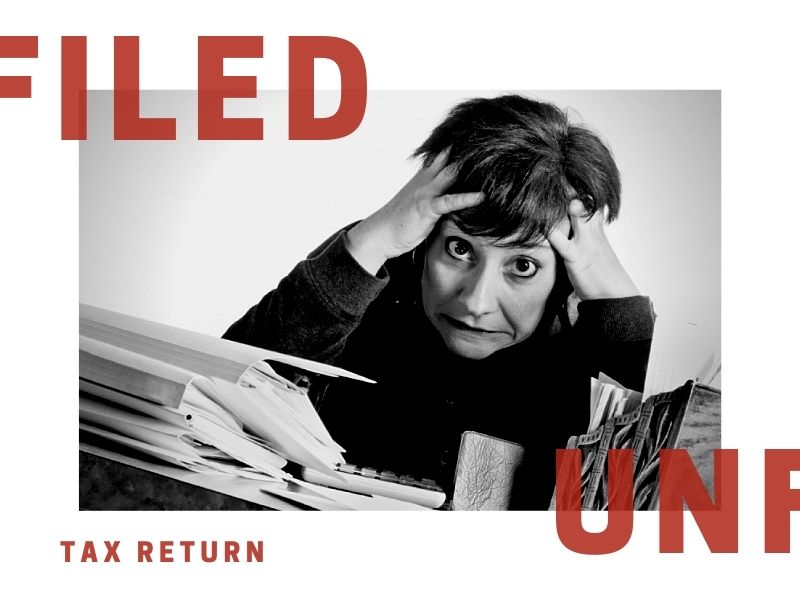The unfortunate reality is that if you don’t file a tax return — even if you don’t owe any taxes that year — there can be problems.
And, that is obviously the case if you do happen to owe taxes. Not only can the federal government stir up trouble for you, but each state has various consequences as well, and states sometimes have certain powers beyond those of the national government (including here in ).
There is both good news and bad news that I want to share with my readers about an unfiled tax return…
Starting on the lighter side — if you don’t owe any taxes — here are some negative consequences of an unfiled tax return …
You Don’t Receive a Tax Refund
If you are due a refund, but you don’t file, simply put, you will not get the refund. This applies to federal, as well as most states with an income tax. You have three years to file your federal return, but after that you lose the opportunity to claim your refund.
Business Owners: Lose Out On Carrying Over Losses
When you have business or investment losses, the IRS allows you to carry forward those losses to offset future years’ earnings. If you don’t file a return the year the loss occurs, you cannot carry losses forward from that year.
You Can Miss Refundable Tax Credits
If you qualify for a tax credit like the Earned Income Tax Credit (EITC), you have to file a return to claim it. This is a refundable credit, and it puts money in your pocket. If you don’t file, you lose the tax credit.
The IRS Might File A Return On Your Behalf — Without You
In some cases, when you don’t file a tax return, the IRS automatically completes a substitute federal return (SFR) for you. This return contains information from W2s, 1099s, or other forms the IRS has received from your employer, your bank, or other entities. Typically, the SFR only has one exemption, no dependents, and the standard deduction.
If you qualify for more than one exemption, have dependents, or itemize instead of claiming the standard deduction, an IRS-prepared SFR will show a higher tax liability than it would if you filed yourself. In some cases, you might not have filed because you believed you owed no tax … but under the SFR that the IRS files on your behalf, you actually DO owe tax — and some of the worst consequences that I will be sharing below begin to kick in.
The Audit Time Clock Never Starts
When you file your tax return, the IRS has three years to audit it. After that point, the statute of limitations kicks in, and the agency cannot typically audit that return. However, if the IRS generates an SFR for you, it can be audited at any time. Again, if you file, you avoid the SFR. The IRS usually waits a few years after the due date to complete the SFR.
You May Not Qualify to Include Taxes in a Bankruptcy
To qualify for both Chapter 7 and Chapter 13 bankruptcy, you need to be current on your tax filing obligations. In most cases, you must have filed the last two years of returns for Chapter 7 and the last four years of returns for Chapter 13.
Trouble Getting Loans
If you don’t file a tax return, loans are much more difficult to obtain. Generally, when you apply for a mortgage, personal loan, business loan, or a loan for higher education, financial institutions will want to see copies of filed tax returns.
Here’s what can happen if taxpayers DO owe tax and don’t file a return …
1) Special Penalties
If you fail to file a Federal tax return by the due date, you face a special
“failure-to-file” penalty if you owe taxes. This equates to 5% of the balance for every month you don’t file. The “good” news is that this penalty maxes out at 25%. If you file at least 60 days late, your minimum penalty is the lesser of $205 or 100% of your tax owed.
2) Possible Incarceration
Jail time is rare but possible. Under federal law, you can face up to a year in jail and up to $25,000 in fines for not filing your return. The penalties are even stricter if you commit fraud. Fortunately, you cannot go to jail simply for owing taxes. Jail time is typically invoked for not filing or for purposefully evading taxes.
3) Publicly Posted Tax Liens
This is when the IRS files a public document called “Notice of a Public Tax Lien.” Consequently, the taxes you owe show up on your credit report. This negatively impacts your credit, as well as puts you in the crosshairs of all kinds of nefarious marketers.
4) Wage Garnishment
IRS wage garnishment takes place when the IRS contacts your employer to have wages withheld from your paycheck to satisfy an IRS tax debt.
5) Bank Levies
The IRS can contact financial institutions or banks you do business with to levy your bank account.
There are a few more things that can happen, but I’ll spare you the especially painful consequences of an unfiled tax return.
Frankly, you are reading this, and it is time for the good news.
Short and sweet: You have us in your corner. There is NO SHAME IN OUR GAME. Which means that you can bring to us your pain, your mistakes, and this will be a “judgement free” zone.
And, even better, we can help you avoid ALL of these consequences of an unfiled tax return with a little bit of our expert help in your corner.
Warmly,
Andrew Grengs
(218) 623-6050
TCG Accounting

